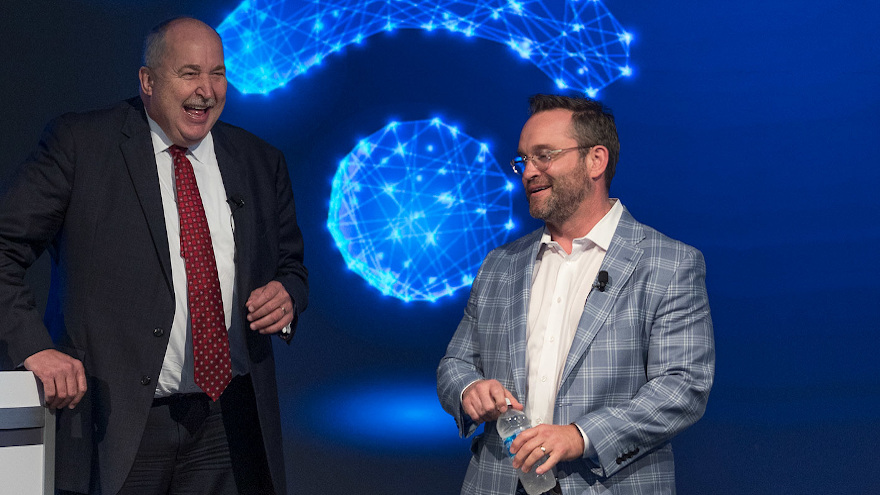From the editor: 3 noteworthy anecdotes coming out of this year’s Auto Intel Summit

Bob Glaser of the North Carolina Automobile Dealers Association shares a laugh with Greg Dudak, who is the general manager of Mercedes-Benz of Fayetteville, after their discussion during the 2022 Auto Intel Summit in Raleigh, N.C. Photo by Jonathan Fredin.
By subscribing, you agree to receive communications from Auto Remarketing and our partners in accordance with our Privacy Policy. We may share your information with select partners and sponsors who may contact you about their products and services. You may unsubscribe at any time.
The Auto Intel Summit made a triumphant return to be an in-person event last week, bringing together one of the most concentrated collections of highly intelligent industry executives and entrepreneurs in a single conference hosted by Cherokee Media Group.
The three days were filled with intriguing presentations and conversations. Here are just three anecdotes that continue to circulate through my mind that you might find interesting, too.
Another supply-chain ramification
For another episode of the Auto Remarketing Podcast, I reconnected with some of the brain trust at Allied Solutions that mentioned another element of how supply-chain issues are impacting automotive.
In many cases before the pandemic, insurance companies wouldn’t declare a vehicle to be a total loss even if it needed significant repairs. However, Allied Solutions described how insurance companies are modifying their strategy to examine how long it might take to repair the vehicle and how readily parts are available. If the calculation is such that the cost would jump too much because of those factors, a vehicle that might have been previously repaired and put back on the road now is being sent to the salvage world.
Like the wholesale and retail markets need fewer vehicles right now for dealers to buy online or in the lanes.
A tasty sounding analogy
On the last day of the Auto Intel Summit, it was my privilege to moderate consecutive panel discussions with seven of those highly intelligent people I previously mentioned. The second segment included veteran executive Scott McMahon, who now is with Equifax and has been with firms such as Autotrader and other shops during his career.
Subscribe to Auto Remarketing to stay informed and stay ahead.
By subscribing, you agree to receive communications from Auto Remarketing and our partners in accordance with our Privacy Policy. We may share your information with select partners and sponsors who may contact you about their products and services. You may unsubscribe at any time.
McMahon used a clever — and perhaps tasty — analogy to describe how startups and other fintech firms are looking to make their place known in auto financing. He described how dealerships and finance companies sometimes can be like milk and chocolate syrup, which can sink to the bottom of a glass without some stirring intervention.
In this analogy, McMahon said fintechs can be the “agitator” that blends together the milk and chocolate syrup (dealerships and finance companies) into something that’s delicious for all parties involved.
I think we can all drink to that.
Response of the conference
Bob Glaser of the North Carolina Automobile Dealers Association again delivered one of the most intriguing sessions of the entire Auto Intel Summit. Glaser assembled and moderated a panel of successful franchised dealers from the Tar Heel State, discussing everything from electric vehicles to what roles dealerships will play long term.
Glaser asked each of the three dealers to summarize in two words the biggest impact dealers are going to face in the next year. Greg Dudak, who is the general manager of Mercedes-Benz of Fayetteville, responded with what might be been the single best reply to any question of the entire event.
“Negative equity.”
Boom.
Afterward, I chatted with other attendees who heard Dudak’s reply and seemed to agree, especially in light if used-vehicle values soften some from where they currently are. One attendee mentioned how he saw the markup of nearly $100,000 on an exotic vehicle that already had an MSRP well into the six figures, resulting in a potential loan-to-value ratio of about 300% if nearly all of the purchase price was financed.
Granted that’s an extreme example. But Dudak’s point is spot on, in my opinion. The three major credit bureaus, plus experts from shops such as Edmunds, Kelley Blue Book and TrueCar all have been tracking how much the average amount financed has been growing for more than a year.
I’m no mathematician, but dealerships and finance companies might have to be doing some creative figures late next year and beyond if someone signed an 84-month contract to get the monthly payment they can afford and then wants to trade much sooner than the term’s end.
Nick Zulovich is senior editor of Cherokee Media Group and can be reached at [email protected].


